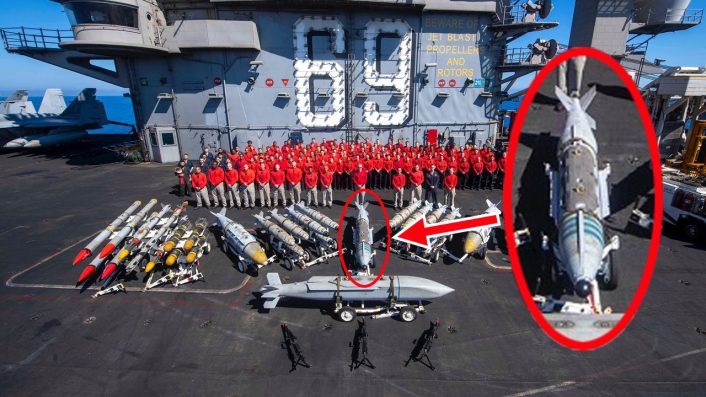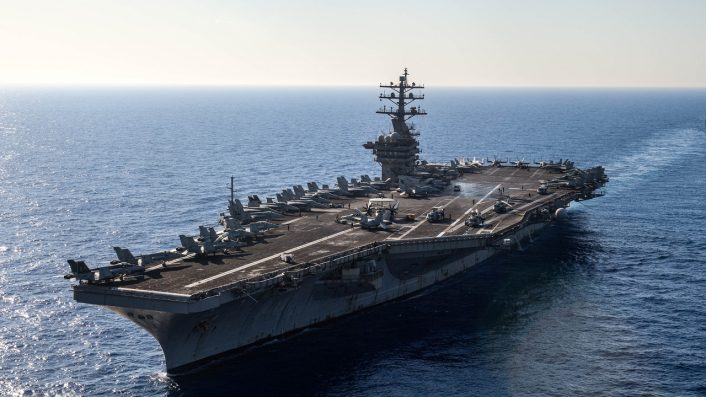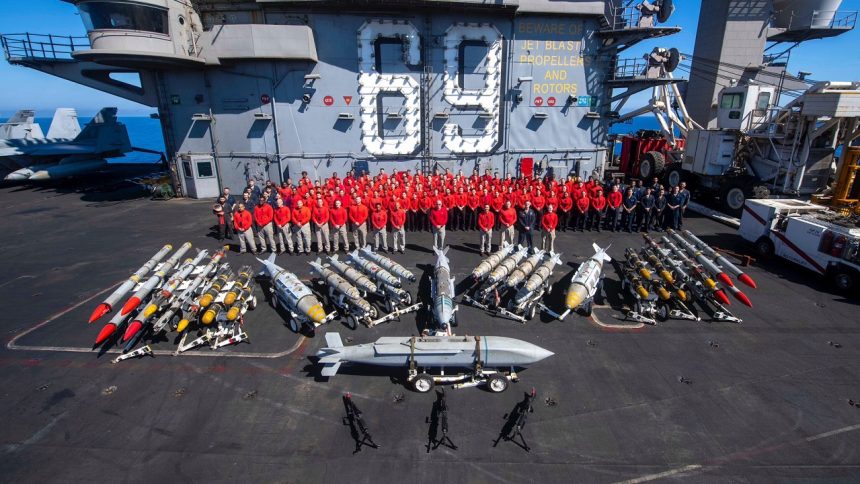Among the showcased weapons there is also the rarely seen GBU-56 Laser JDAM with the BLU-109 penetrator weapon, which replaced the legacy GBU-24 Paveway III.
After an eventful nine-month deployment, the USS Dwight D. Eisenhower (CVN-69) aircraft carrier, also known as “Ike”, is finally crossing the Atlantic Ocean to return home. The Carrier Strike Group (CSG) has been busy intercepting Houthi attacks against military and commercial vessels in the region, striking Houthi positions and rescuing personnel from attacked vessels.
The Ike deployment was extended for two times, making the Navy’s second oldest aircraft carrier the busiest one, as it was deployed for more days than any other U.S.-based carrier for the last five years (almost 600 days so far). During the latest deployment, the CSG participated in Operations Yukon Lightning and Prosperity Guardian to support maritime security and stability in the Middle East region.
Mighty Ike weapons department. Guess what they did in the Red Sea. pic.twitter.com/LwKmQgR5K3
— Chowdah Hill (@ChowdahHill) July 7, 2024
On Jun. 22, 2024, the carrier entered the Eastern Mediterranean after departing the Red Sea and is sailing the Atlantic Ocean en route to its homeport of Norfolk, Virginia. The Commander of Ike, Captain Chris “Chowdah” Hill, posted on his social media profiles a photo to praise the efforts of the carrier’s Weapons Department.
The photo shows the personnel posing with a variety of air launched weapons, including AIM-120C/D AMRAAM and AIM-9X Sidewinder air-to-air missiles, AGM-114 Hellfire air-to-ground missiles, AGM-154 JSOW glide bomb, GBU-31 and GBU-38 JDAM and GBU-54 Laser JDAM bombs and, in the middle, what is possibly the most interesting of the bunch, a GBU-56 Laser JDAM with a BLU-109 penetrator warhead.

The GBU-56 Laser JDAM
The GBU-56 Laser Joint Direct Attack Munition (JDAM) is one of the latest munitions to enter service with the U.S. Navy and Air Force. The 2,000 lb dual-mode weapon couples the GPS/INS precision of the JDAM and laser-designated accuracy of a laser-guided bomb into a single weapon.
The LJDAM also provides added capability and flexibility to the existing inventory of precision-guided munitions to satisfy the ground moving-target capability, as well as the capability to be employed against targets of opportunity. As for the standard GBU-31, there are two variants with either the Mk-84 warhead or the BLU-109 warhead.

While the former has been adopted by the U.S. Air Force, the latter was developed for the Navy. In fact, the Navy said it also developed the GBU-56 Laser JDAM for the BLU-109 penetrator to replace the legacy GBU-24 Paveway III weapons systems and improve performance in highly contested environments.
The penetrator variant of the weapon is reportedly designated GBU-56(V)4/B, fitted with the same KMU-558 Guidance Set of the standard Navy GBU-31(V)4 penetrator, but with the addition of the DSU-42/B laser sensor. Work to develop the weapon and integrate it on the F/A-18 has been ongoing at least since 2010.
Ike’s deployment to the Red Sea
The USS Eisenhower deployed on Oct. 13, 2023, and headed to the Red Sea, as part of the U.S. response to the Houthi attacks on commercial ships and posture in light of the war between Israel and Hamas. During the deployment, the CSG flew over 30,000 hours and sailing over 55,000 miles, according to the Navy.
The IKECSG is comprised of Nimitz-class aircraft carrier USS Dwight D. Eisenhower (CVN 69), the Ticonderoga-class guided-missile cruiser USS Philippine Sea (CG 58), Carrier Air Wing (CVW) 3 and its nine squadrons, Destroyer Squadron (DESRON) 22 and the Arleigh Burke-class guided-missile destroyers USS Mason (DDG 87) and USS Gravely (DDG 107), and the Information Warfare Commander.
Squadrons of CVW-3 include the “Gunslingers” of Strike Fighter Squadron (VFA) 105, the “Fighting Swordsmen” of Strike Fighter Squadron (VFA) 32, the “Rampagers” of Strike Fighter Squadron (VFA) 83, the “Wildcats” of Strike Fighter Squadron (VFA) 131, the “Screwtops” of Carrier Airborne Early Warning Squadron (VAW) 123, the “Zappers” of Electronic Attack Squadron (VAQ) 130, the “Dusty Dogs” of Helicopter Sea Combat Squadron (HSC) 7, the “Swamp Foxes” of Helicopter Maritime Strike Squadron (HSM) 74 and the “Rawhides” of Fleet Logistics Support Squadron (VRC) 40.
Fair winds and following seas to the Dwight D. Eisenhower Carrier Strike Group (IKE CSG) as they return home to their families.
Flying over 30,000 hours and sailing over 55,000 miles the IKE CSG demonstrated our commitment to regional stability and protected freedom of… pic.twitter.com/CA9W3l7g2R
— U.S. Central Command (@CENTCOM) June 22, 2024
While operating in the U.S. 5th Fleet, the IKECSG conducted operations in the Red Sea, Bab Al-Mandeb Strait, Gulf of Aden and Arabian Gulf including Operation Prosperity Guardian and self-defensive strikes into Iranian-backed Houthi-controlled areas of Yemen.
Since their arrival in the area, the ships of the CSG cooperated to repel one-way attack UAVs, anti-ship cruise missiles, anti-ship ballistic missiles, with the F/A-18E/F Super Hornets also called into action in a coordinated effort together with surface-to-air weaponry. Because of this focus on the air-to-air mission, F/A-18E Super Hornets were photographed carrying 9 air-to-air missiles, including five AIM-120 AMRAAMs and four AIM-9 Sidewinders.
The carrier has also been involved in multiple air strikes against Houthi targets in cooperation with the UK, with the first one launched as a consequence after the Houthis launched a complex drone and missile attack aimed at a fleet of American and British warships. The latest strike confirmed by the Navy was on May 30, when the IKECSG led a coalition strike on 13 Houthi targets in Yemen.
Supersonic fly by. You can hear the thump of the sound barrier breaking. It’s a little louder in person. pic.twitter.com/GLFR9pzfnw
— Chowdah Hill (@ChowdahHill) July 6, 2024
During one of these strikes, on Feb.24, an EA-18G Growler struck a Houthi Mi-24 Hind attack helicopter on the ground with an AGM-88E Advanced Anti-Radiation Guided Missile (AARGM). The Navy confirmed that this was the first instance of AARGM use in combat, performed during a joint and coalition effort that struck 60 Houthi targets across 16 sites in Yemen.
Shortly before leaving the Red Sea, on Jun. 15, IKECSG Sailors rescued the crew of M/V Tutor that was attacked by Iranian-backed Houthis. The ship, attacked on Jun.12, was left unable to maneuver due to severe flooding and damage to the engine room, prompting the evacuation.
Because of their actions throughout the deployment, the IKECSG crews received awards, including the Combat Action Ribbon, as well as personal military decorations that include the “V” and “C” devices, for valor and combat, respectively, and the Bronze Star Medal without devices. The Air Medal has also been authorized.
Secretary of the Navy Carlos Del Toro and U.S. Naval Forces Central Command approved the award for units that “rendered satisfactory performance under enemy fire while actively participating in combat engagements that occurred in the Red Sea area,” said a Navy official.









